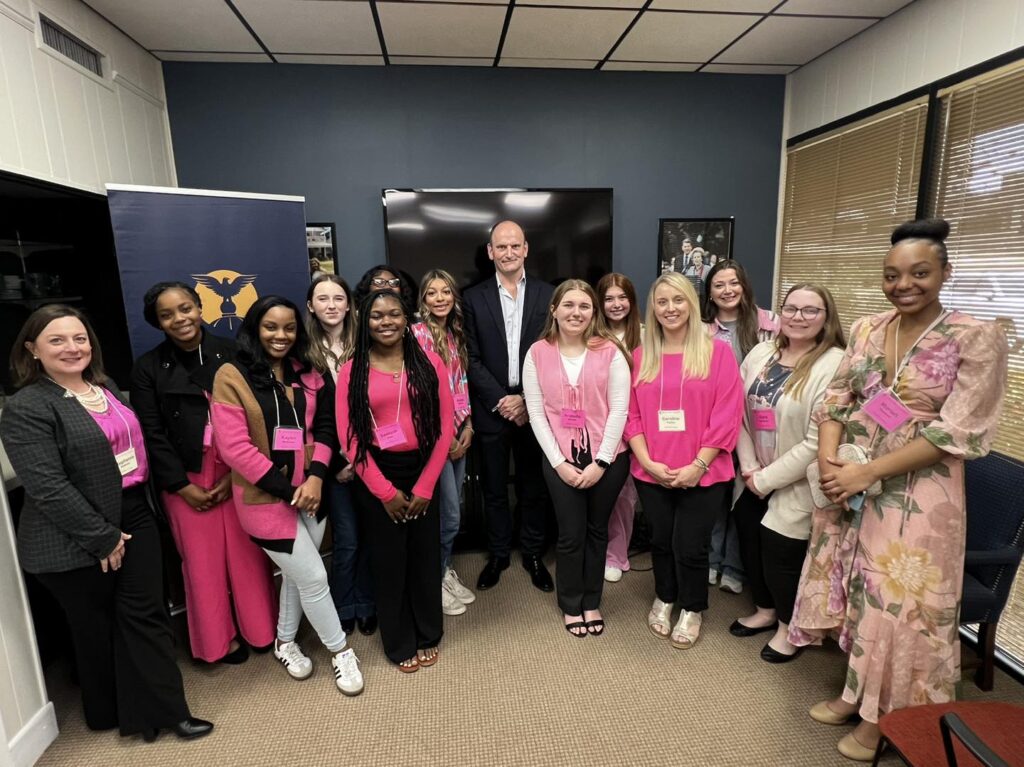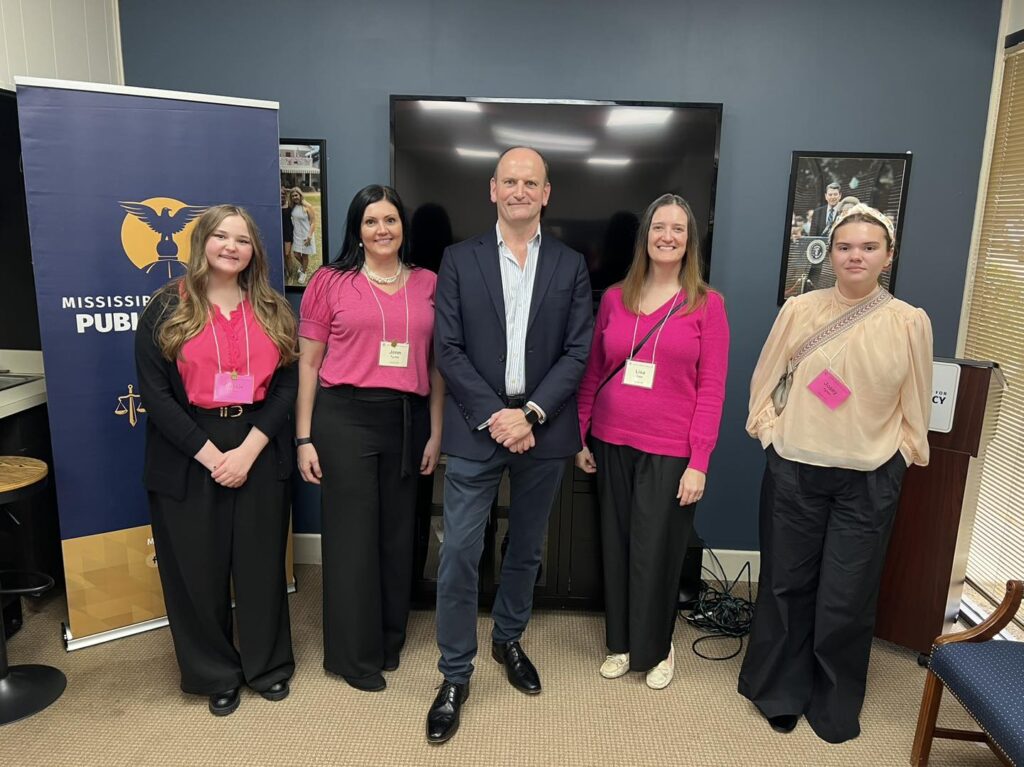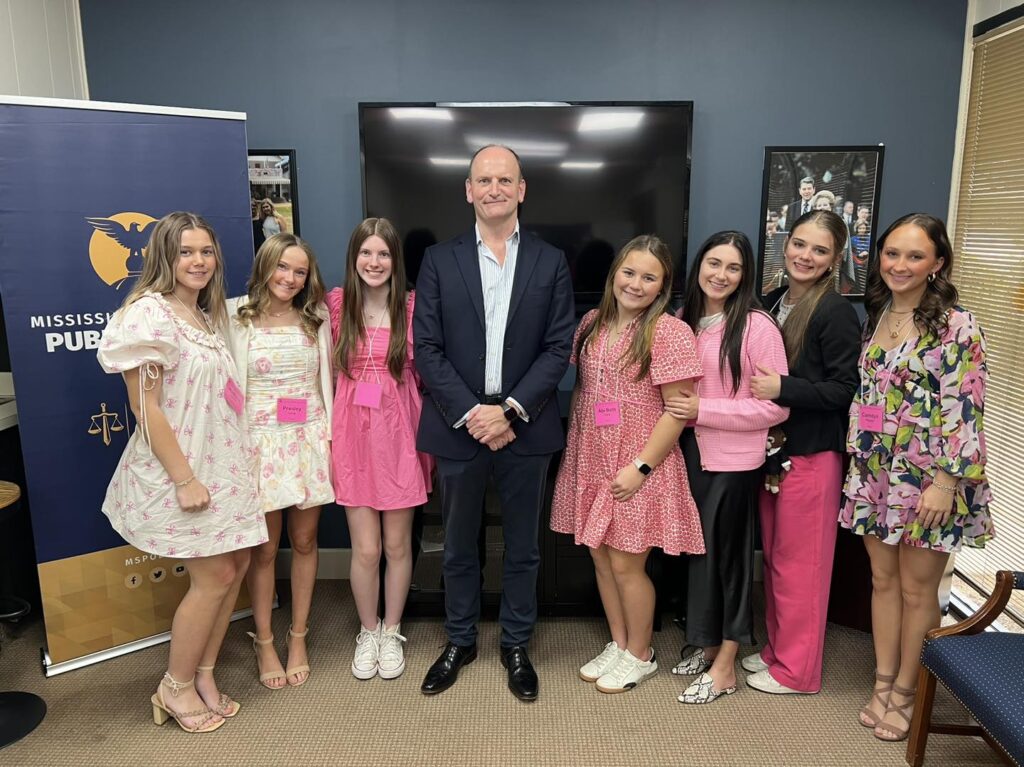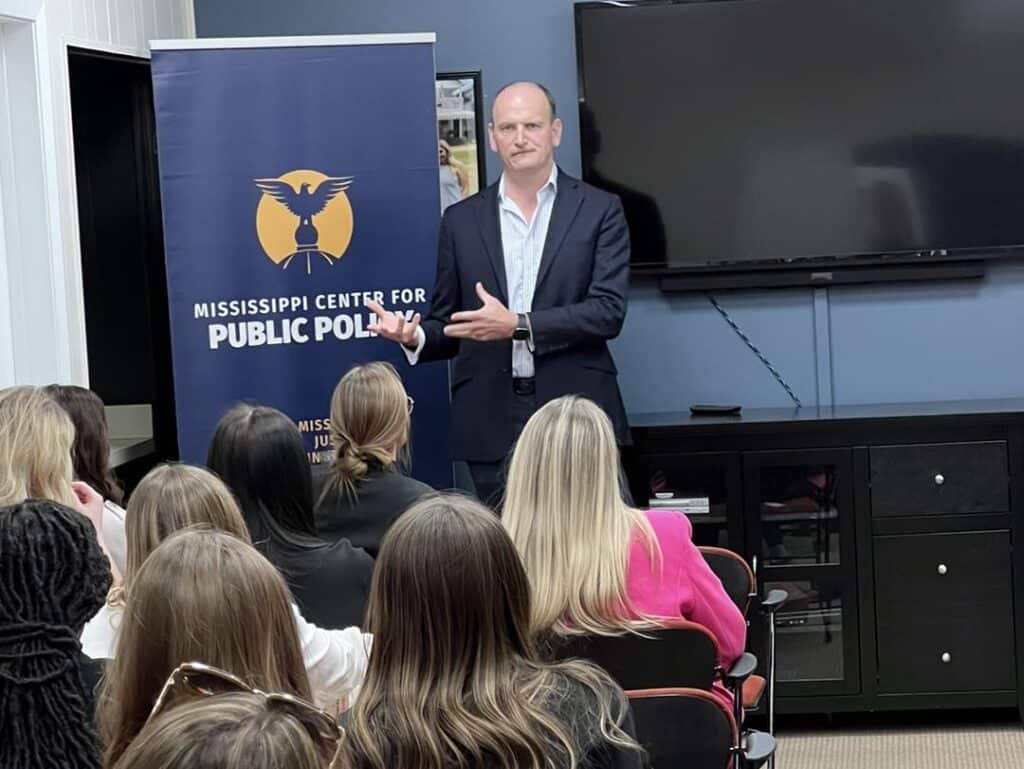Mississippi is shedding its image as an economic laggard. Over the past five years, the state’s economic output has grown more than it did over the previous fifteen years combined.
According to the U.S. Bureau of Economic Analysis, Mississippi posted the second-fastest per capita GDP growth and fifth-fastest personal income growth among all states in Q4 2024. Billions in capital investment have flowed in.
This growth is happening across the state—from the Gulf Coast and Pine Belt to DeSoto County, the Jackson metro area, and the university hubs of Oxford and Starkville.
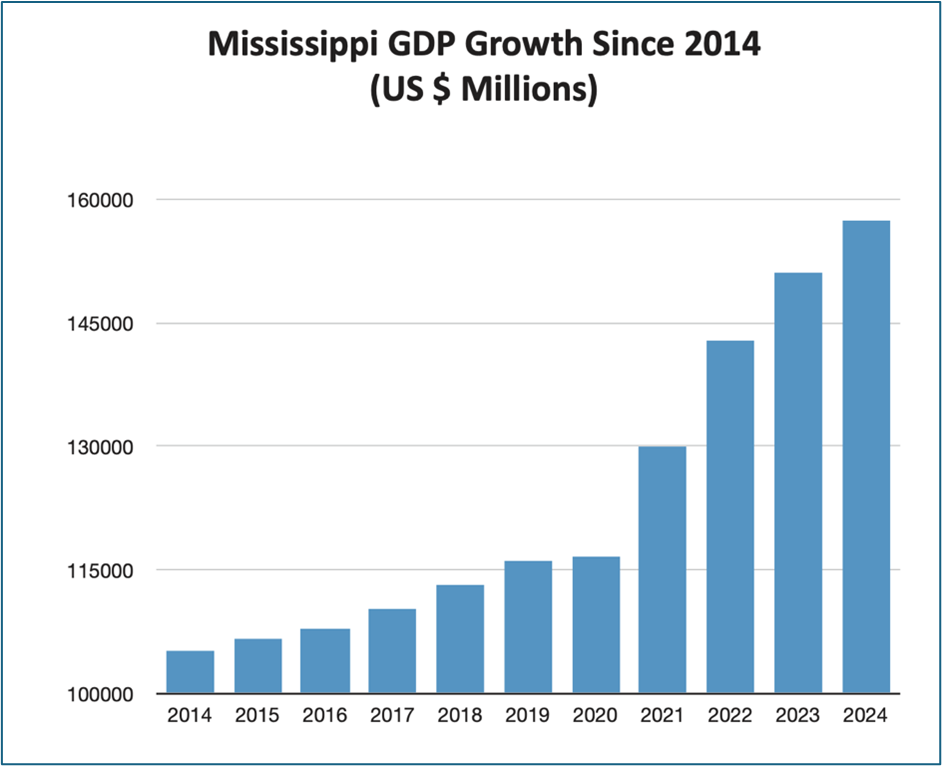
Mississippi whoooooosh!
Mississippi’s recent growth is no accident. It is down to good public policy. Since 2022, Mississippi has implemented transformative tax cuts, reduced the state income tax and lowered the grocery sales tax and easing business inventory taxes. A 2021 law streamlining occupational licensing reduced barriers for workers and entrepreneurs, with the Mississippi Secretary of State reporting a 12% increase in new business registrations in 2023 alone.
Energy in our state is affordable, Mississippi electricity rates averaging 13.43 cents per kilowatt-Hour, helping draw in energy-intensive industries, including two major data centers in Madison and Rankin counties. To top it all, Mississippi’s public universities are fueling growth, and around Oxford and Starkville, entrepreneurial ecosystems are thriving.
But to maintain this momentum, our state needs to abandon policymaking as usual and embrace bold reform. That’s why the Mississippi Center for Public Policy (MCPP) has just launched The Mississippi Miracle? Bold Reforms for Growth.
Our paper details practical steps to sustain and accelerate this momentum:
- Empower Parents Through School Choice: Let families use state funds for public, private, or homeschooling options to drive competition and elevate education standards.
- Refocus Higher Education: Cut administrative bloat, prioritize workforce-relevant programs, and redirect resources from low-value courses to practical, job-focused education.
- Rein in Public Spending: Cap budget growth to population growth plus inflation to ensure fiscal discipline and curb waste.
- Cut Red Tape: Eliminate outdated regulations, repeal Certificate of Need laws, and create a business-friendly environment to spur innovation.
- Reform Public Procurement: Mandate transparent, competitive bidding with regular audits to prevent cronyism and maximize taxpayer value.
- Promote Welfare-to-Work: Emphasize work requirements, job training, and time-limited benefits to foster self-sufficiency and reduce program costs.
These reforms are practical policies that lawmakers can implement to improve lives across Mississippi.
To explore them in detail, visit mspolicy.org under “Publications” or email me at [email protected] for a direct link.
MCPP has a small, but highly productive team. We punch above our weight, producing policy proposals that become law, and helping set the agenda at the Capitol. We are able to do all this because we have the input of so many people across our state. Please read our proposals and share your thoughts—I want to hear what you think.
For decades, Mississippi exported people. Young people in particular tended to leave our state for places like Atlanta, Nashville, Huntsville and Austin.
I believe the tide is starting to turn. I often hear anecdotes of young people moving back to Mississippi. The data suggests that growth in our state is creating opportunities and drawing more people to move here .
Have a read of our report and help us build on this momentum.
The Mississippi Center for Public Policy was honored to welcome members of the Mississippi Federation of Women’s Clubs (MFWC) Juniorettes for a special visit to its headquarters.
During their visit, the Juniorettes engaged in discussions about the principles of limited government, free enterprise, and individual liberty. MCPP’s President and CEO, Douglas Carswell, shared insights on current legislative initiatives and the impact of policy decisions on communities across the state. The students also had the opportunity to ask questions, participate in interactive discussions, and gain a deeper understanding of how public policy affects everyday life.
MCPP is committed to fostering informed discussions on public policy and welcomes opportunities to engage with students, educators, and community organizations. The organization looks forward to continuing to support young leaders as they develop their knowledge and passion for civic engagement.
The news about Mississippi just keeps on getting better!
First, the Mississippi House passed a bill to allow public to public School Choice. Not far behind is a bill that would allow a form of public to private School Choice.
A few days before that, the House passed a proposal to eliminate the income tax. Then they went and passed a bill to repeal lots of protectionist red tape that restricts the healthcare economy in our state. They even found time to pass a bill to remove the absurd law that prevents adults in our state from buying wine online.
Even the Senate went and passed a bill that has the potential to stamp out Diversity, Equity & Inclusion (DEI) ideology in our public universities.
It would be premature to start celebrating these wins for freedom. Each of these bills still needs to be voted through by both chambers before heading to the Governor’s desk. But it is hard to think of a year in which at this stage in the legislative session the prospects of reform shone as brightly as they do today.
After years of seeing free market reforms killed by vested interests in committee, our lawmakers suddenly seem to be giving conservative voters conservative policies.
For decades, vested interests at the state Capitol were able to stifle change. This helps explain why Mississippi was often thought of as 50th out of 50 states. Perhaps it is time to think again?
As Governor Tate Reeves keeps pointing out, Mississippi has momentum. In the second and third quarters of last year, our state had one of the fastest growing per person incomes and per person outputs of any US state.
Yes, you read that right. Mississippi was one of the fastest growing states in America.
This new growth data might only be a snapshoot, rather than a trend. However, if our legislature really does pass all of the measures listed above, Mississippi will be on an upward trajectory for sure.
Of course, even as you read this, an army of lobbyists with their snouts in the Jackson trough are frantically trying to kill off these proposed changes.
The absurdly named “Parent’s Campaign” has gone into overdrive to try to prevent giving actual parents more choice. Fake conservatives are thinking up a hundred reasons why we cannot afford tax cuts. Those Tate Reeves calls the “coalition of the status quo” are trying desperately to keep things the way they are.
Perhaps most dangerous of all are those commentators who have spent years excusing inertia by implying that Mississippi can only manage to make one change at a time. We will hear plenty of fatuous arguments that the state legislature only has the bandwidth to implement change at a snail’s pace. Some will tell us that this is the Mississippi way. Nonsense. Never accept excuses for mediocrity.
If the state legislature in Arkansas and Alabama can cope with tax cuts, school choice and deregulation at the same time, so can we.
A great deal of the credit for this reformist momentum is due to Speaker Jason White and his cadre of conservative lawmakers. We must pray that the Speaker and his team hold their nerve. Let us cheer on Speaker White as he faces down the vested interests that want to hold Mississippi back. Let us call out the hypocrisy of the smug, self-satisfied anti-school choice activists that sent their own kids to private school. Playing nicely with such people never works, so don’t.
Real conservative lawmakers who want to see Mississippi grow can vote for these changes in the knowledge that we have a President and a primary base behind them all the way!
Our state is now completely surrounded! Tennessee has just passed an Education Freedom Act, meaning that every single surrounding state is a school choice state.
In Tennessee from 2025 families will be entitled to an education freedom scholarship worth $7,075. Capped to 20,000 low income families at first, the idea is that in a couple of years every family in the state can use their pot of money for tuition and fees at a public school or private school of their choice.
What about Mississippi? Are we in danger of being left behind by our bolder neighbors?
Every time there is any suggestion that families be allowed to have any control over even a tiny portion of the $14,676 that it costs to educate a child in the public system, there is an outbreak of outrage. Often those most vocally opposed to school choice have been wealthy liberals who sent their own kids to private school. None of the bills being considered in the Mississippi legislature this year offer anything as comprehensive as Tennessee’s Education Freedom Act.
There is, however, a very sensible bill offering a step towards more public-to-public school choice, HB1435. This bill would allow students in a public school to take their share of the education budget to a public school of their choice – if the recipient school has capacity.
Under the excellent leadership of Speaker Jason White, Rep. Rob Roberson and Rep. Jansen Owen, HB1435 is now out of committee and heading to a vote on the floor of the House. The bill still faces many obstacles, but it can no longer be quietly killed off. (See Texas primary elections for details).
A second bill, HB1433, would allow students in failing districts to take about $6,600 of their share of education funds to a private school. It would be similar to what our neighbors do, but for a handful of school districts.
With all our neighboring states on board with school choice, it would be absurd if even these modest steps towards school choice are derailed. Of course, even these modest proposals have generated the usual hysteria from the so-called “Parent’s Campaign”. Comically, the “Parent’s Campaign” describes a bill to allow parents more choice between public schools as “troublesome”.
Desperate to find a reason to oppose HB1435, they attack it on the grounds that it might require school districts to determine what their capacity is. Pesky parents, eh? Given what conservative leaders have now accomplished in every neighboring state and given the unequivocal support for school choice from President Trump, it will be interesting to see if any Republicans dare to vote against.
The White House just announced a roundtable on school choice with top Republican governors. The event, moderated by Arkansas Governor Sarah Huckabee Sanders, who spearheaded a major victory for school choice in her state after taking office, is an attempt to encourage pro school choice conservatives to move ahead with passing legislation.
Opposing school choice in Mississippi is probably not a great career move for any Mississippi Republicans. Nor is would it help raise standards in our schools.
Momentum is with parent power. This is a fight we can and must win.
How much do you imagine it costs to send a child to public school in Hinds County every year? $5,000 per year? Maybe $10,000? $15,000?
Actually, according to data from the Mississippi Department of Education, when you divide the number of students attending school by the total expenditure, in 2023-24 Hinds County spent $16,589 per student.
That is more than twice the average private school fees in our state. Indeed, $16,589 is not far off what it would cost to send your child to a top private school.
Now ask yourself if each child in Hinds County is getting a top education for that $16,589? Of course not. A large chunk of the kids can’t read or do basic math. One in three of them regularly skip school.
So, why not give families in Hinds County the right to take a portion of that $16,589 and allocate it to a school of their choice?
It’s not just Hinds County. The same question could be asked in Madison ($17,037 spent for every public school pupil per year) or Rankin ($15,198 per pupil per year), or Canton ($18,683) or De Soto ($13,820).
Even if you take the Department of Education’s own more conservative figure for per pupil spending (which includes all the ‘no-show’ students), Mississippi still spends an average of $14,676 per student.
Despite all that money, 4 in 10 fourth graders in Mississippi public schools cannot read properly. Eight in 10 eighth grade kids in Mississippi were not proficient in math in 2022. One in 4 kids routinely skips school.
Nor has $14,676 per student spending translated into better teacher pay. Notwithstanding recent pay increases, our teachers still earn significantly less than they did in 2010, when you adjust for inflation.
If you happen to be one of the fortunate families happy with the public education options available, great. No need to change and no one is proposing any changes that will affect you. But why not allow those families unhappy how things are the freedom to take their tax dollars to a school that best meets their needs?
Suggesting this provokes outrage not from parents, but from various vested interests who like things the way they are. They like a system that puts the $14,676 they get for your child into their administration budget, rather than the classroom. School superintendents making more than the Governor want to keep control of their multimillion dollar budgets for a reason. It’s a boondoggle for bureaucrats.
School Choice will not impoverish public schools. The legislation that Speaker Jason White is proposing would allow families control over the state portion of funding, not locally raised revenues or federal dollars.
In Hinds County, for example, that would mean families being able to allocate no more than $6,700 of the $16,589 overall per pupil funding. (Rather than depleting Hinds County public schools’ budget, actually it would make Hinds County better off in terms of per pupil spend.)
Giving families control over $6,700 of the state funds will not mean a flood of kids coming into your well run school district. Why not? Because the legislation proposed specifically gives school boards the final say on capacity.
What anti School Choice campaigners really fear is not the “wrong” kids coming to your school. What they fear is that you start wondering what the heck they’ve been doing with the $14,676 they get for your child or grandchild every year.
All of the arguments we are now hearing against School Choice in Mississippi have been heard in each of the surrounding states that have since adopted School Choice.
Alabama’s new Educations Savings Account program, which has just opened for applications, has been wildly oversubscribed. The program provides $7,000 funding per student attending a participating private school, while those enrolled in home education programs are eligible for $2,000 per student.
Arkansas allows all K-12 students access to an Education Savings Account from 2025, into which the state government pays the state portion of per pupil funding ($6,600 per year). Families will be able to use this $6,600 money they are given to pay for their child education, including private school tuition. Arkansas also allows public to public school transfers, allowing districts to define capacity.
Louisiana’s GATOR program starts in 2025-26 and establishes an Education Savings Account for those on low incomes, with the details are still being finalized as the law only recently passed. Louisiana already has public to public School Choice.
Texas and Tennessee, too, are at this very moment debating legislation that would create a universal Education Savings Account for families in those states, too.
None of the scare stories we now hear in Mississippi materialised in any of these neighboring states. None of these states has been bankrupted like the critics claimed by letting mom and dad have parent power. Instead, all the evidence suggests School Choice has started to improve education outcomes.
Another week, another massive investment project was unveiled in Mississippi. On Thursday, Governor Tate Reeves announced that a $10 Billion data center is coming to Meridian. One deal alone isn’t proof that the economy is taking off, but it does add to a pile of evidence suggesting that Mississippi could be on the cusp of a new era of growth. If Mississippi keeps going the way data from the Bureau of Economic Analysis suggests we are moving, this state won’t be 50th out of 50 for much longer.
Is it too far-fetched to imagine young people wanting to move to Oxford, Starkville, Laurel, or the Coast, the way they currently want to go to Austin or Nashville?
Encouraging, too, is Mississippi’s political leadership at the start of the new legislative session.
Income tax abolition, essential if we are to be competitive, is now the number one priority for the Governor and the Speaker, Jason White. School choice, the only sure fire way to improve education standards and prepare young people for the world of work, is on Speaker White’s priority list for this legislative session. Removing red tape, particularly as it restricts the healthcare economy, is also being actively considered, with the State Board of Health firmly committed to change.
These changes are essential if our state is to seize this once-in-a-generation opportunity. But even now the forces of inertia are trying to stop change. If they succeed, Mississippi will stall.
(Almost) everyone now says they support income tax elimination. Yet some are quite clearly only paying lip service to the idea, desperately seeking to avoid passing legislation this session that commits to actual elimination. At the same time, they talk up the idea of cutting the grocery tax as a deliberate distraction strategy, knowing full well that cutting the income tax would have vastly more impact.
While Mississippi considers school choice, we are surrounded by states that are actually doing it. Tennessee is in the process of passing the legislation this week. Yet the forces of inertia in Mississippi say we need more time to consider Education Savings Accounts. Really? Can you not look across the state line at Arkansas or Alabama to see how it is transforming education for the better? Perhaps your call for “more time” just an excuse?
Maybe, like the disgraceful School Superintendent in Madison County did this week, the forces of inertia circulate false claims about school choice? (No, public to public school choice does not take away local tax dollars, since it only involves the state portion of the budget. No, private schools do not lack accountability. They are more accountable than any public school.)
The sort of misleading claims made by the Madison School Superintendent are attempts to prevent change by those that think they, not pesky parents, know best for your child. The forces of inertia are also lobbying aggressively in the legislature to kill off reforms that will remove health care regulation that intentionally limits the number of providers. The truth is that for years all of those against lower taxes, less regulation and opposed to school choice in our state have been able to get their way. That is why Mississippi has not grown the way Alabama or Texas have. I’m optimistic that this time the forces of inertia can be overcome. Why?
Firstly, it is increasingly obvious that Mississippi could be doing things differently. You only need to look across the river at Arkansas under Sarah Huckabee Sanders (tax cuts, school choice, red tape removal), or Alabama (ditto), or at almost any southern state to see it. Secondly, Trump. The 47th President is committed to tax cuts, red tape reduction and school choice. This will help tilt opinion in our state.
Imagine for a moment that you are a local Republican party office holder keen to catch the eye of the new White House administration. Perhaps you want an appointment or some kind of endorsement? Do you really imagine Donald J. Trump would pick you out in such a crowded field if you have been anti-tax cuts? Do you honestly think Team Trump would say, “Yes, Mr. President, this local guy in Mississippi who killed off School Choice is our guy”? If nothing else, self-interest will move the dial towards the right agenda in Mississippi over the next four years.
Finally, I think inertia can be overcome because of Elon Musk.
Something weird has happened since Elon bought X / Twitter. Politics is now increasingly unfiltered. Even if you are one of a majority of folk that don’t use X, you will have felt the effect of this form of unfiltered politics. The forces of inertia can be petulant. They can lobby and bully to try to stop change. But they cannot any longer escape the consequences of trying to stop change. Cheer up! 2025 is going to be awesome. Mississippi is on the cusp a great change.
Did you know that Mississippi is now one of the fastest growing states in America? Only two states saw real GDP rise faster than it did here in the third quarter of 2024.
Were you aware that personal income in our state rose more here than almost anywhere in the US this past year?
New data from the Bureau of Economic Analysis shows that Mississippi is on the up.
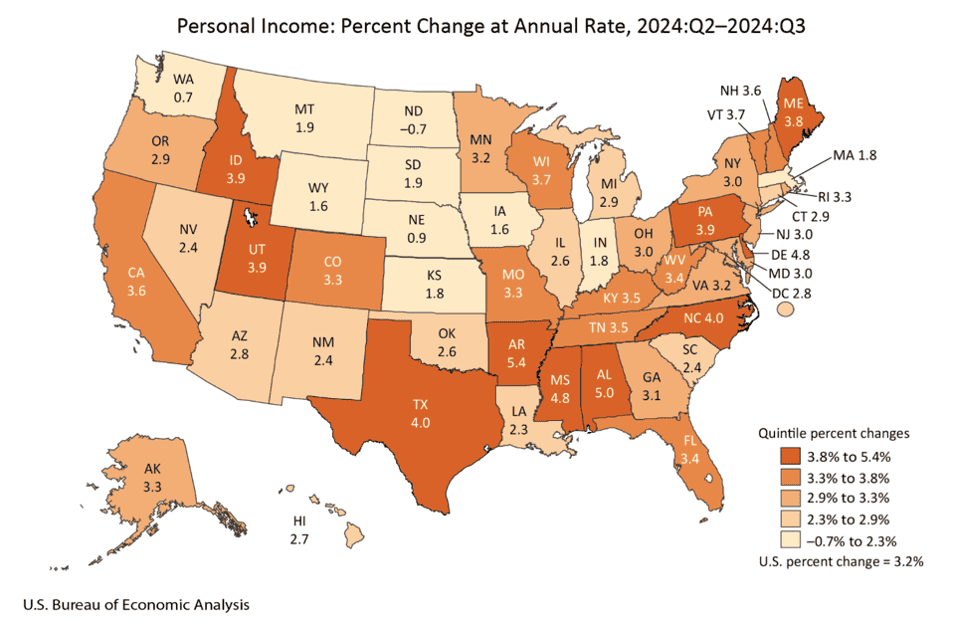
For as long as anyone can remember, Mississippi has ranked 50th out of 50. Not for much longer, perhaps. According to this new data, ours’s was one of the top performing states in 2024. If we keep growing for the next few years the way we did in 2024, we won’t be bottom of the class for much longer.
Mississippi’s success is not an accident. It’s a consequence of a number of key free market reforms:
- Labor market deregulation, with an Occupational Licensing law in 2021.
- Tax cuts with legislation to cut the state income tax to a flat 4 percent in 2022.
- Further tax reform to make it more tax efficient for businesses in 2023.
- Education funding reform as a step towards school choice in 2024.
These reforms have begun to energize our state. They make it easier for people to get ahead, for businesses to invest, and for families to spend their income on their priorities. They draw in inward investment, which is changing our state for the better.
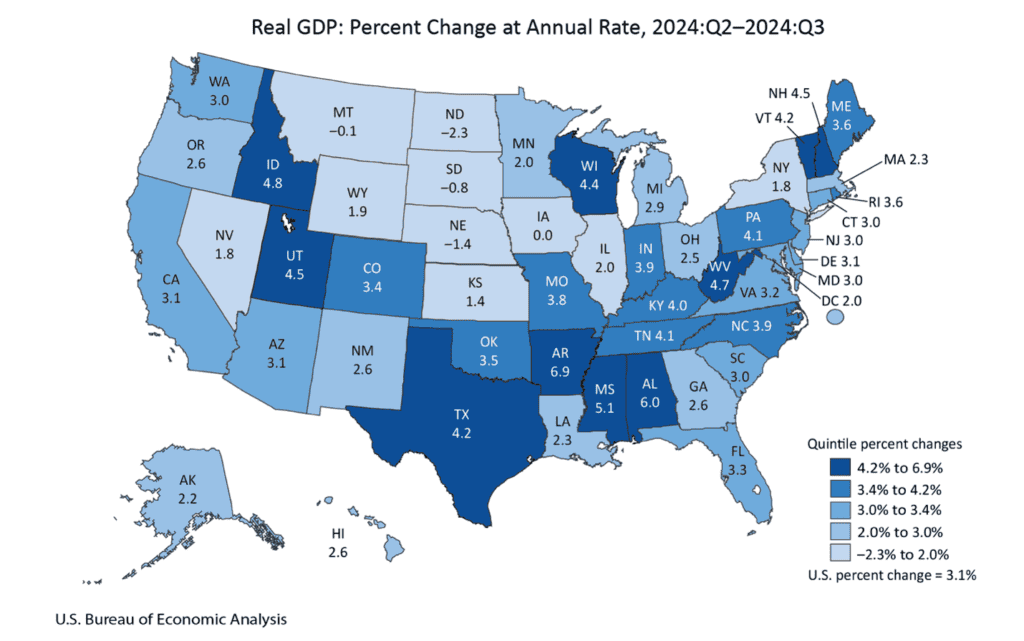
If Mississippi is not to lose this momentum, we need to go even further. That is why MCPP has just published a Blueprint for Mississippi – a list of the ten key reforms that would lift our state to the top of the economic table.
The number one reform we need to prosper is school choice. Why? School choice is the only way to be certain of raising standards. The better job we do of educating young people, the greater their chances of leading a prosperous, fulfilling life.
Our Blueprint sets out how we can accomplish school choice, giving every family in our state the choices that today only the very rich enjoy.
To prosper, our state needs less regulation and less government. Our Blueprint sets out proposals to cut taxes further and dismantle the costly, leftist bureaucracy that seems to be in control no matter who you vote for.
Decades of crony cartel politics has stifled innovation in our state. Years of lobbyists cutting cozy deals in the Capitol that commercially advantage their clients has held Mississippi back. A lot of the intentionally restrictive laws that limit health care provision simply need to go. Our Blueprint sets out how to make this happen.
MCPP has been a driving force behind many of the key free market reforms that have helped energize our state. But at every opportunity, crony cartel politics has tried to prevent change.
The crony cartel will try again. It’s what self-serving cartels do. Already they are mobilizing half-baked arguments against school choice. They are lobbying to maintain intentionally restrictive laws that hold back the healthcare economy. Brace yourself for politicians explaining why we can’t afford tax cuts despite a healthy surplus.
In politics, nothing moves unless it is pushed. MCPP won’t just publish our Blueprint. We will push and push hard. Mississippi’s future is too important to let bad politics get in the way.
Mississippi could be on the cusp of transformative changes. If we keep going, we will not only no longer be 50th, but we could become – like Tennessee or Alabama – a state that young people want to move to, not leave.
Download a copy of our blueprint here!
Imagine a world in which the President of the United States could prevent you from reading a story about incriminating emails found on his son’s laptop?
Actually, that’s what happened. When the New York Post ran a story about Hunter Biden’s laptop, administration officials put pressure on media outlets to prevent you from reading it.
Envision an America in which articles about the origins of Covid could be taken down by administration officials during the pandemic? You don’t have to imagine. That’s literally what they did.
If you are appalled at the prospect of powerful politicians trying to suppress awkward opinions, I suspect you’d be concerned at any attempts by some in our state to restrict debate and discussion on certain topics, too.
Unfortunately, some state officials seem to think they can bully organizations like MCPP in order to shut down what we say. This seems to be the case with school choice, an issue on which every conservative ought to agree. Some evidently don’t agree and are mad at us for promoting change.
MCPP is 100 percent committed to parental choice as the only certain way to raise standards and counter left- wing values in the classroom. We relish the opportunity to listen to those with different ideas and engage with those that have a different viewpoint.
Anyone is free to disagree with us. But no one that disagrees with our stance should ever try to shut down our advocacy the way Biden’s gang shut down the Hunter laptop story.
Here’s why we won’t be cowed.
First, it’s a question of credibility: MCPP is a conservative think tank. That means we’re cheerleaders for conservative policies, but not for any politicians.
To be sure, we probably agree 90 percent of the time with most elected state-wide officials. But when we disagree, we won’t hide the fact. Instead, we will do so openly, honestly and dispassionately (maybe even using a little humor from time to time ….) A think tank that shied away from asking state leaders questions that they’d rather not answer wouldn’t be worth a dime. Why would anyone take such an organization seriously?
Second, you are the media: Biden’s gang, like politicians down the ages, tried to bully media organizations into ignoring inconvenient stories. That tactic doesn’t work anymore since Musk set social media free.
Each week, MCPP reaches tens of thousands of folk across our state. We do so with published articles and media appearances. But the single biggest way we reach people is directly, the way I’m connecting with you now. Our email list has tens of thousands of subscribers, and a phenomenal open rate. This Wednesday, I uploaded a short video in the morning. By lunchtime it had been viewed 48,000 times. As of now, it’s been seen over 130,000 times – a high percentage in Mississippi. Thanks to Elon Musk’s X, we reach several million people every month, again many in Mississippi. Unless anyone has the power to shut down our social media operation, we are going to keep going.
Third, and most important, School Choice is right: School choice is, as President Trump has said, the civil rights issue of our time.
It's more than about school standards. The case for giving families control over their child’s share of tax dollars is moral. MCPP has outlined a three-step strategy to achieve universal school choice in our state. We are surrounded on three sides by conservative led states that have adopted school choice.
People are free to disagree with us. So, too, are state-wide officials who can vote against school choice or kill it in committee (like some did with the ballot initiative, and anti DEI legislation and much more besides). But equally organizations like MCPP are free to explain to the public who is supporting school choice and who is trying to kill it. We won’t be cowed.
Of course, what made the story about Hunter Biden’s laptop so explosive was not what was on the laptop. It was the realization as to what some were prepared to do to suppress stories they didn’t like. Nothing perhaps could be more ruinous the reputation of any politician.
Parental choice is the only certain way to raise standards and counter left- wing values in the classroom. MCPP has a plan to make this happen in Mississippi.
Mississippi is already surrounded on three sides by states that have school choice. Arkansas, Alabama and Louisiana have all now passed legislation to give families control over their child’s share of the education budget. However, perennial efforts to achieve something similar in Mississippi through Education Savings Accounts, or ESA's, have failed. Each time a universal ESA proposal has been attempted the legislation dies. We would love to see a universal program of publicly funded ESA's in Mississippi, which families could use to pay for school, but I believe the chances of such legislation passing anytime soon are slim.
That’s why MCPP is pursuing a different three step strategy to achieve universal school choice in our state:
- Step One – An individual budget for every student: During the last legislative session, MCPP spearheaded efforts to secure a school-funding formula in order that every public school student now has a personalized education budget.
We did so knowing that once each student has a personalized budget, it becomes much easier to argue that they should then be allowed to take their budget to a school of their choice. We have achieved this.
- Step Two – Public-to-public school choice: Thanks to a bill (HB 1341) passed in the last legislative session, military families, including those in the National Guard, are able to send their children to a traditional public school of their choice—if it has capacity.
We are openly pushing for legislation in the 2025 session to allow each student to take their personal budget to a public school of their choice, giving every family in Mississippi the right that military families enjoy. Responsible conservative policy means allowing school boards to have the final say over capacity and giving strong safeguards to school so that they do not have to take students with a history of disciplinary problems.
- Step 3 – Parental Choice Tax Credit: Tens of thousands of families in our state choose not to send their children to public school, either because they homeschool or they send their children to private school. We believe they should be able to claim a refundable income tax credit to help them with expenses, like tuition and fees.
We have a carefully costed plan for a Parental Choice Tax Credit that would achieve this, building on the tax credit system we already have. Interestingly, the Republicans in Washington, D.C., have indicated that they might pass a similar tax credit federally. These three steps would ensure universal school choice in our state—and give families in Mississippi the choices that families now have in neighboring states. The good news is that Mississippi is already halfway to making this happen!
Morton Blackwell, the great conservative activist, likes to say that “In politics nothing moves unless it’s pushed”. MCPP is happy to push – and to push hard …. even if it upsets one or two anti-school choice activists. It’s what we exist to do.
We are open about our goal and our strategy for achieving school choice because we know that sunlight is the best disinfectant. There’s no need for mystery and opaque maneuverings. Nor will we shy away from engaging directly those that might like to stop parental choice by stealth. If school choice is opposed by lawmakers that sent their own kids to private school, we won’t hesitate to ensure that Mississippi knows.
Over the course of the coming months as we head into the 2025 legislative session, I will be sure to update you on progress – and I’ll be sure to inform you who supports and who opposes parental choice! This is a fight we can win!

